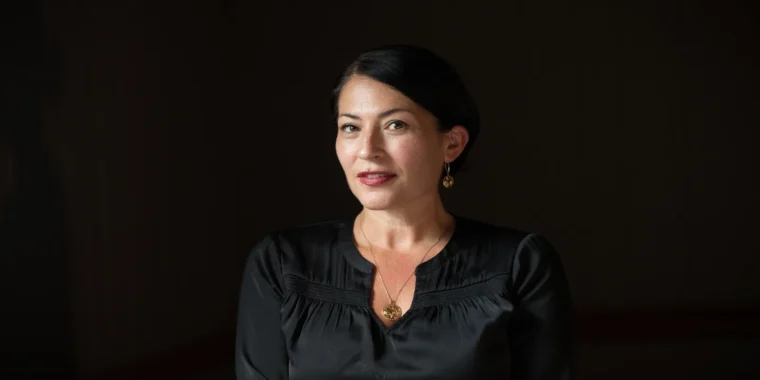
On Saturday afternoon, hundreds gathered in the Paramount Theater to hear from the 24th U.S. Poet Laureate, Ada Limón. The conversation, which headlined the Virginia Festival of the Book, was moderated by Kiki Petrosino, Professor and Director of Creative Writing in UVA’s Department of English.
Limón began by reading several poems from her newest book, The Hurting Kind. Although the idea of “hurt” is generally perceived as “heavy,” Limón said her title poem is really a celebration of gentleness, tenderness, and sensitivity, centering love. Many of the poems in the collection began as letters she wrote to her family members in the midst of COVID-19 isolation. She hopes her work gives readers permission to “be more tender and more open to the world.”
In explaining the process of crafting her poems, Limón articulated that she never knows the direction a poem is going, but rather it is revealed to her while writing. She believes each of her poems has something to teach her and encourages readers to be open to receiving what a poet is offering.
Limón also described one of her largest projects as Poet Laureate, an original poem for NASA’s Europa Clipper spacecraft. The poem is engraved on the Clipper and will be sent on Earth’s first mission to conduct detailed reconnaissance of Jupiter’s second moon. Reading from “In Praise of Mystery: A Poem for Europa,” Limón said, “It is not darkness that unites us, not the cold distance of space, but the offering of water…We, too, are made of wonders, of great and ordinary loves, of small invisible worlds, of a need to call out through the dark.”
Following her conversation with Petrosino, Limón fielded questions, many of which came from UVA students and employees. She discussed her lifelong search for belonging, her openness to the opinions of loved ones, and the importance of “embracing the unknowable” as a poet. The audience was entirely captivated by Limón’s words, frequently cycling between pin-drop silence and eruptions of laughter and applause.
To aspiring poets and any listeners searching for inspiration, Limón suggested reading widely and being comfortable in silence: “Wherever you find silence, that’s where you can hear yourself again, and that’s where the poem begins again.”


Leave a Reply